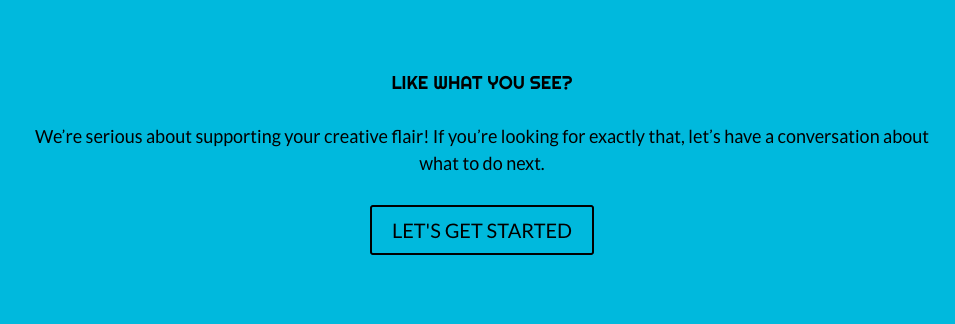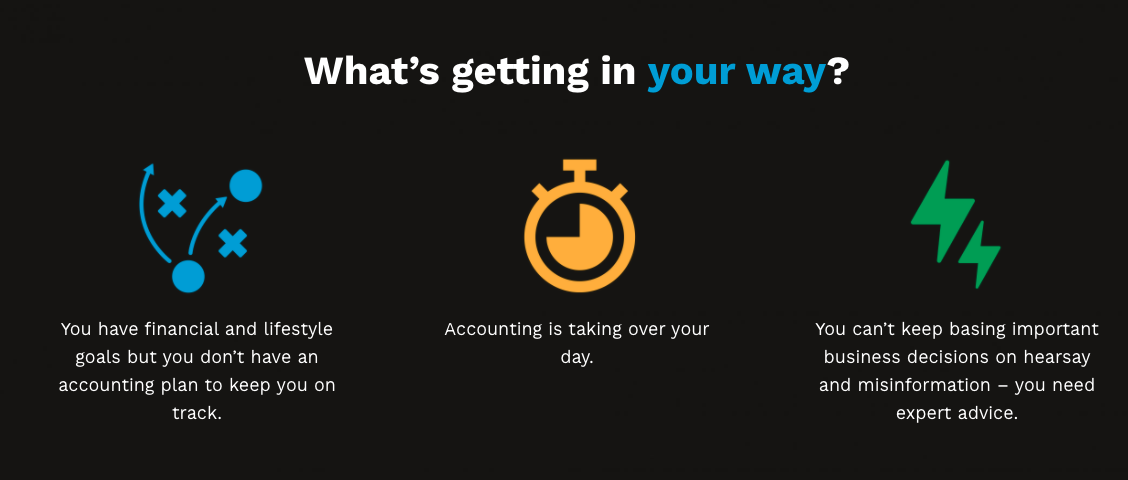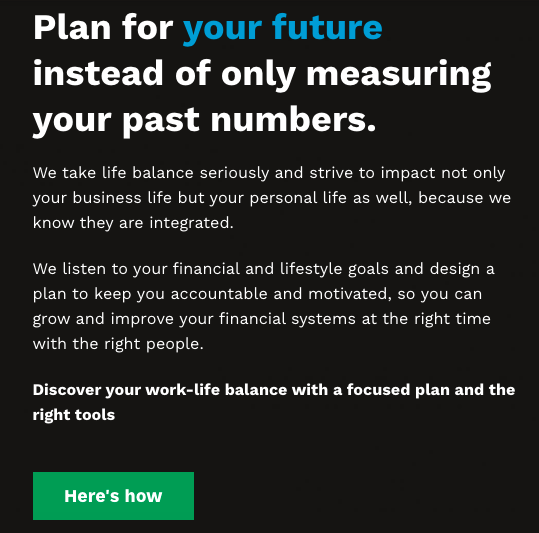
Getting a new website built is a big investment. While there are plenty of free DIY platforms to build a site on, and lots of free image libraries, you still need the words, too.
When it comes to website copy, there’s far more to it than simply words. Doing it yourself may seem like the best option – and is what many agencies or website designers may ask you to do – but not only will it cost you more time and money in the end… writing it yourself will likely not reach the kind of clients you want to.
This is because website copy is much, much different than other words. Writing a blog is fairly easy: you pick a question your clients ask, and answer it. But website copy is a different ball game altogether.
Website copy shares the REAL message you want your prospects to hear
If you got a prospect into a meeting, would you win them over? Most accountants would say yes – “If I could just meet with them, I could talk with them and listen to them and help them understand our value”.
What if your website did that for you? Before you ever met them?
Your website is generally the first thing your prospect will review before deciding to work with you. It’s like your business CV. And nearly every buyer looks at your website before getting in touch – or even if it’s a strong referral, and they contact you directly, they’re still going to curiously check your site and socials.
And a good website is a reflection of your accounting firm’s brand.
First impressions count. Your brand will either make a great impression or it won’t. A strong brand is a reflection of a strong company, one who knows who they are and who they help.
Your client wants to feel impressed, to feel safe, to feel like you know what you are doing. They want to see your character and your style – are you a cool, modern accountant with a fun side that loves to help small businesses achieve life balance or are you a traditional, corporate accountant that works with bigger firms and cares about growth? This all needs to be expressed with your brand – which is far more than your logo and colours.
It includes your words, too.
Your website explains who you are, who you help, what the plan is and how to get there. It shows prospects you understand their pain points and not only know how to help but have experience doing it. When you look at your website now, is it possible it’s just sharing words, without a real message? Without actually getting across to your prospect everything you’d say in a meeting?
The web copy, together with the website design, tells the prospect what to do and leads them on a certain path through your website – your client journey. It shows them what you want them to read next and which action you want them to take, without them even realising it. They aren’t only taken on a journey through your website, but through your firm too.
Your tone of voice is also really important on your website. If you use the “standard” accounting firm language – modern, forward thinking, cloud accounting, etc – they won’t have any way of knowing who you truly are.
Your true tone – the kind which would come across in an email or a message you sent – needs to be evident in your web copy as it gives your prospects a better understanding of who you really are and how you are different to other firms. It helps to attract certain kinds of people. For example, if you want to attract creatives, you’ll generally use more relaxed, fun, tech related content. If you want to attract more corporates, you’ll be using more professional, formal wording, and possibly more technical language.
Think about what your prospect really wants. What do they need? What do they know about accountants or think they know? How do they feel when they come to your site?
One example of this is the standard “Services” page on an accounting firm website. You may think you need a Services Page on your site, right? Why is that? Because everyone else has one.
But most accounting firm prospects either know (or think they know) more or less what an accounting firm does. And either way, even if they know about things like management accounts and bookkeeping and payroll and tax planning, the prospect doesn’t know what they need right now anyway. That’s why they’re getting in touch. So a list of services they might not understand will feel overwhelming.
They need you to understand their pain points and to show them the solution. When you build your site based on the real client journey, clients do the right things at the right time and you build the best relationship.
Let’s not forget about Calls to Action (CTA’s). What action do you want them to take on your website? Not just what you WANT them to do, but what is BEST for them to do? CTA’s are something people know they need and often just throw in casually without thinking about the end result. Think about the specific wording on your buttons and links as well as the wording leading up to your buttons.
A strong, more specific CTA will always lead to a better relationship. Instead of just having a button saying ‘Click here to get in touch’, think about what you want your prospect to do first – and why.
Raedan works with creative businesses and their CTA not only shows this but it also tells the prospect what they are ‘getting themselves into’ if they click the button.

Writing website copy isn’t the best use of your time (and you may not know how to do it yet)
As an accountant, numbers are your strong point. This doesn’t mean you can’t also enjoy writing. But if writing isn’t something you enjoy doing, you aren’t going to dedicate the right amount of time to it in order to do it well.
If you DO like writing, this isn’t writing like you know it. Writing blogs and documenting systems is different to writing website copy. Documenting a system is a step by step process, with lists of tasks and actions. Writing a blog has one particular theme or topic and it’s generally an opinion piece or the answer to a question.
How is your website copy different? It’s like a map, but instead of images, it’s created using words. It tells your prospect where you want them to go next on the website. It pinpoints your prospects problems and issues (perhaps even ones they didn’t realise they were struggling with), and it’s full of emotions. It speaks the same language as your prospect and instead of treasure, it shows your prospects the ‘way’ to get them from feeling uncertain, unsafe, lost and confused to certain, happy, validated and confident with a plan to move forward.
While we stick by the fact everyone is creative, writing website copy has much more strategy and depth to it than you may think. It’s far more than just words.
Do you realistically have the time to write all the copy for your website? Being a business owner is exhausting. You have a team to manage and you’re working hard to get more business. You end up being not only the owner, but the HR, ops manager, the sales manager, the finance team and the marketing team.
And even if you do find the time, will you do it properly? Or will you just sort of copy the sort of thing other accountants are saying? (Even if you don’t technically plagiarise their content, you’re still borrowing their ideas and sounding like everybody, or nobody.)
And when you rush the process of website copy, you confuse your message and your prospects and either attract the wrong types of people or attract no one at all.
The process isn’t just about writing the words, but also reviewing your brand to make sure it attracts only the clients you want, defining your target audience, working out your key messages, defining your tone of voice and picking out your calls to action. It also involves identifying pages fitting with your client journey, and figuring out the main call to action for each of those.
We are busy working on a brand new website for PF ourselves. We’re only part way through the process and we’ve already put a fair amount of time into it. The whole PF team met 3-4 times specifically to talk about the website, then we worked on it in our team retreat. Each team member wrote up some key messages and we reviewed them and discussed them. Our marketing team all worked together on each page – the words, the messaging, the visuals, the journey. Then our Content Writer reviewed each page. It’s a major undertaking, and it needs to be. It’s not just words.
When you write copy yourself you are trying to save money and time, but end up spending far more than you planned (and with a worse result)
Your time is valuable. Work out what an hour of your time might cost you and you’ll be surprised how expensive writing copy yourself might be.
Let’s say you spend 3 hours per webpage, and you have 5 pages: that’s already 15 hours of your time.
Now let’s be realistic…3 hours is more like 5 hours, as you’ll keep coming back to it, changing a word here and there. You’ll also be thinking about the content in the shower, on your walks, before you go to sleep at night and during your lunch break.
Before you know it, writing the content of your website has taken at least a full working week, or more. If you have someone write the website copy for you, you’d be better off using those thought times (your morning walks, in the shower) to comment on and contribute to what’s already being worked on. As a business owner, you don’t mind this kind of thinking all the time. You do it naturally anyway.
And because you aren’t a content writer (particularly of website copy), it will take you longer than someone who knows how website words work. And it won’t be as good.
Good content writers don’t just write words, or throw together copy. They are creative by nature. They know how to focus on brand and tone of voice. They know how to write in a way that sounds like someone else. They think about the client journey and the website structure and how one piece of content fits in with another piece of content somewhere else on the site.
You are too close to the subject to be unbiased
In your head, your accounting firm is possibly the ‘best firm ever’. You’ve been in business a while, have built a small team, you’re attracting clients, are doing a great job with the ones you have and are slowly building a successful business.
If you write your website copy yourself, you will either find it hard to talk about yourself…or you’ll feel like you need to ‘big yourself up’. You might come across as bragging or alternatively, you might not give yourself enough credit.
Working with someone who understands website copy, the whole marketing picture, and the creativity of words, will help you paint a more realistic picture of who you truly are. Not a family member or a friend but someone who is experienced at copywriting and who you feel safe with. They’ll ask the right kinds of questions and dig deep to get to the key points of why you exist, who you are trying to help and what you have to offer that makes you stand out. You have the marketing gold dust about your business in your head (and your heart), but you need someone to pull it out of you.
Don’t just hand over the reigns. Be involved in your website copy
When we build a website for a client, they go through a Foundations Workshop with us first which is four 90 minute sessions all about their goals, brand, ideal clients, website journey and marketing planning. Why? It’s important to understand how the process works and to have the answers to questions your content writer might ask you before writing your website copy. During the Foundations Workshop, we ask the right types of questions to get the bits of marketing gold dust we know you have.
When you get someone to help you write your website copy, you’ll still need to be involved in the entire process. You’ll have a workshop or a strategy session before they start, will be meeting throughout the process and will need to review what they’ve written.
Okay, I’ll get help with website copy. How do I decide who to use?
Now you’ve made the decision to get someone to help you write your website copy, here are a few questions to answer so you work with the person or agency who is right for you:
1. Know who the content is for, so you attract only the best clients for you
Do you have a niche? Do they use specific jargon? Perhaps your niche is influencers. They are most likely going to have plenty of words and phrases that are specific to their niche. They’ll probably even abbreviate certain software and apps – they might call Instagram, Insta and YouTube, YT for example. If you use similar words, you are more likely to attract them and make them feel comfortable.
How clear are you on exactly who your ideal client is? Many accountants describe their ideal client in terms of their size or turnover or number of employees. But it’s more important how THEY would define THEMSELVES.
Your ideal client might be female between the ages of 25 – 40, or they might be start-ups who are looking to grow in the next 12 months. Make sure your content speaks to your ideal client so you are attracting those types of people and putting off those prospects who aren’t your ideal clients. Good marketing divides.
What are their characteristics? A few examples – tech focused, appreciative, respectful, willing to change, interested in their numbers, friendly, talkative, energetic, growth hungry. If your ideal client is tech focused, have a tech page, speak about your systems and software and how you use that to solve their problems.
What are their pain points? What are their external and internal problems? For example, perhaps they are scared of doing things wrong and being fined in the process. Perhaps they don’t know where to start when it comes to their finances and they are up all night with worry. How do these pain points differ to other types of prospective clients? Don’t forget to mention these on your site as well.
2. Define your tone of voice and share this with your content writer
Are there any words you won’t use? At PF, we don’t use the word ‘should’ as it feels pushy and shaming and we don’t want our prospects and clients to feel bad if they haven’t done something they need to. We’ve learned from experience accountants feel bad enough about marketing already – you don’t need someone else telling you all the things you’re doing wrong. You need encouragement, support, motivation. You need to be reminded you are amazing at what you do, and it’s a matter of getting that across. Write down any words you don’t want your team to use at your firm.
Will you use swear words? This might seem like a strange question but swear words are fine for some firms if used in the right way. If you are someone who swears at the right time with prospects and clients then it’s okay to use them in your content. If you wouldn’t dream of swearing in front of a client, then swearing on your site is a no go.
What kind of style does your firm have? Do you have a formal, professional style or are you relaxed and fun? It’s important to think what your ideal clients’ style and tone of voice might be. If you are wanting to attract creatives, you are far more likely to use relaxed, fun, creative wording instead of more corporate content.
3. Focus on the problem, not the solution.
Don’t display a list of services on your website. Your prospects don’t know what the solution is right now so they don’t know which service is right for them. They’ll only end up feeling overwhelmed and confused with all the options.
They do know what they are struggling with though and they want to know you understand their problems. Mention the problems they might be trying to solve on your website first, then note down how you will use a specific plan to get to the solution.
They also want the confidence of knowing you have a plan, a way, a journey, a process. They will be far more likely to get in touch and to work with you in the best and most efficient way possible, when they follow a process you’ve already defined. If your action is simply “call us today”, then you are just like every other boring accounting firm website. If your action is “start your journey with a discovery call” (or workshop or video or training), they know you have a plan, and have done this before.
Heighten Accountants have a section on the home page of the website that speaks about the issues their ideal prospects might have.

Then they introduce the plan and link to their How You Grow page to show the steps you need to take to partner with them best as well as the packages you can choose from.

4. Less ‘we’, more ‘you’
Your website isn’t your autobiography. It isn’t just about you, but rather how you help your ideal clients. Even your ‘about’ page which suggests it is about you, is really about your prospects and clients.
The best way to start a relationship is to build a connection. The best types of connections involve emotions. Your prospects want to know you understand their problems and the things they are struggling with. They want to know you care and you empathise with them. People love to read about themselves so write about your prospects. You want your prospect to say ‘This firm understands me and they can help!’
Just as your brand isn’t for you, your website isn’t for you either. It’s for them. Entirely.
5. Show, don’t tell
Don’t tell your prospects you are the experts, show them. One of the best ways to do this is to let your clients do the talking. Use case studies and testimonials and sprinkle these throughout your website and social media.
MAP have dedicated a whole page to client stories on their website and have also added client video testimonials throughout their site. Video testimonials are the most effective way of telling your story as it comes from an unbiased source, and it comes from a real person (instead of a written testimonial which could be made up).
Saint & Co have plenty of experience in the industry but instead of saying “we are really experienced”, they say “We’ve been part of your community since 1884. We’ve been running a business, just like yours, for over 100 years. We’ve felt the highs and lows of all the challenges you’re facing, and survived the tough times.”
At PF, our values are who we are. They aren’t just something we stuck on our website and never looked at again. It’s one thing to tell people what your values are, but it’s so much more important to live those values and show people how important they are to you. Use your values during your hiring process, during your firing process, to work on partnership issues with clients and team members and to recognise clients and team members when they live up to your values.
Remember, your website copy is far more than just words. It tells your story and shows your ideal prospects how you can help with their story.
Some of these questions might be hard to answer right now and that’s okay. It might even cause you to question your brand or your ideal client and that can feel scary. Our Accelerator course has been created for ambitious accountants who want to become better marketers and attract only the clients they love. It will not only teach you the foundational elements of marketing but it will help you figure out steps 1 to 5 above so you can find the right type of person to write your website copy, and the best person to share your firm’s story.

